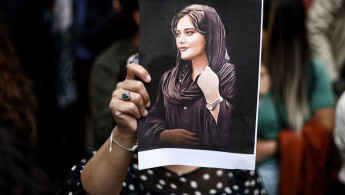Heavy security in Iranian cities on anniversary of Mahsa Amini's murder, as West announces new sanctions
Iranian security forces deployed in the hometown of Mahsa Amini in anticipation of a flare-up in unrest marking this weekend's first anniversary of her death in morality police custody, witnesses, social media posts and rights groups said on Friday.
The Sept. 16 death of Amini, a 22-year-old Kurd arrested for allegedly flouting the Islamic Republic's mandatory dress code, sparked months of anti-government protests that spiralled into the biggest show of opposition to Iranian authorities in years.
Many, with women and young people often at the forefront, called for the end to more than four decades of Shi'ite clerical rule. Over 500 people including 71 minors were killed, hundreds injured and thousands arrested in the unrest that was eventually crushed by security forces, rights groups said.
“There’s a heavy presence of security forces in Saqez,” a right activist in Iran told Reuters, referring to Amini’s birthplace in the western province of Kurdistan. Another activist said a small gathering of protesters chanted anti-government slogans before quickly dispersing.
The two activists spoke on condition of anonymity, citing a fear of government reprisals amid an increasing clampdown on dissent as Amini's death anniversary approached.
Social media posts spoke of security force deployments in several cities, mainly within Kurdistan. The reports could not be immediately verified.
In a statement, the Norway-based human rights group Hengaw said several Kurdish cities in western Iran “have experienced an atmosphere of intimidation and the declaration of a state of war in recent days”. It said numerous citizens had been detained.
Hengaw added that military personnel were positioned on top of Tapeh Qawkh, a hill overlooking Saqez, while residents had witnessed a surge in helicopter activity over the city.
Social media posts quoted Saqez residents as saying that authorities had installed new surveillance cameras around the city apparently to monitor and identify protesters.
Reuters could not verify any of these accounts.
Continued human rights abuses, new Western sanctions
Iranian authorities have accused the United States and Israel and their local agents of being behind the unrest to destabilise the country.
In a report last month, Amnesty International said Iranian authorities "have been subjecting victims' families to arbitrary arrest and detention, imposing cruel restrictions on peaceful gatherings at grave sites, and destroying victims' gravestones".
Security forces detained Amini’s uncle Safa Aeli on Sept. 5, relatives told Reuters.
Many journalists, lawyers, activists, students, academics, artists, public figures and members of ethnic minorities accused of links with the protest wave, as well as relatives of protesters killed in the unrest, have been arrested, summoned, threatened or fired from jobs in the past few weeks, according to Iranian and Western human rights groups.
Iran's Etemad daily reported in August that the lawyer for Amini's family also faced charges of "propaganda against the system". If convicted, Saleh Nikbakht faces a jail sentence between one and three years.
The Iranian regime's anticipation of further unrest related to Amini comes as the UK, US, Canada and Australia announced a raft of new sanctions to mark the anniversary of her murder.
The sanctions target several senior regime figures responsible for enforcing Iran's mandatory hijab law.
“A year on from Mahsa Amini’s tragic death at the hands of Iran’s Morality Police, I commend the bravery of Iranian women as they continue to fight for fundamental freedoms," UK Foreign Secretary James Cleverly said today while announcing the sanctions.
"Today’s sanctions on those responsible for Iran’s oppressive laws send a clear message that the UK and our partners will continue to stand with Iranian women and call out the repression it is inflicting on its own people," he concluded.
(The New Arab Staff and Reuters)




 Follow the Middle East's top stories in English at The New Arab on Google News
Follow the Middle East's top stories in English at The New Arab on Google News


